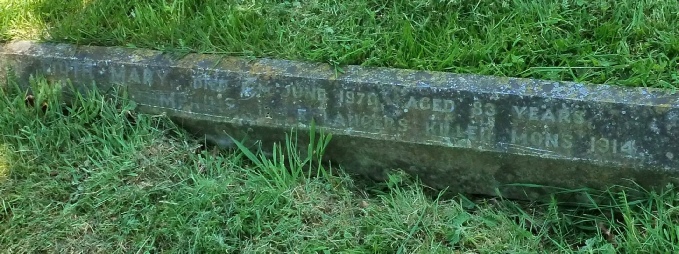Friends of Hastings Cemetery

BA G19
Edward He was the son of Joseph and Sarah Tompkins, of Wimbledon, London and the husband of Edith Mary Tompkins, of 15 Tower Road, St Leonards.
Quartermaster Sergeant Edward James Tompkins 12th Royal (Prince of Wales) Lancers was killed at Mons on 28/8/1914 at the age of 31. On the 28th August 1914 the 12th Lancers were involved in a cavalry battle with a regiment of Prussian Dragoon Guards near the village of Cerizy, and it is thought he was fatally wounded in this action, as the 12th Lancers war diary records a Thompkins as amongst the casualties.*
He is buried in Moy-
[*A full account of the action in which he was killed can be found in a family tree on www.ancestry.co.uk . Some of the information for this biography came from the same source for which many thanks.]
Edward was born in Paddington in 1884, one of ten children. In 1891 his family was living at 6 Swinbrook Rd, Kensington. By 1899, at the age of 16 he had joined the army and served in the South African Campaign (the Boer War), where he was awarded the South Africa Medal with clasps ‘ Cape Colony’, ‘Orange Free State’ and ‘Transvaal’.
In 1902 he was serving with the 12th Lancers in Umballa, India, Sialkhot in Pakistani Punjab and Sindh.
He married Edith M. Winton in Karachi in 1908. She was a local girl having been born in Rye on 24th July 1886. (The other person in the grave is probably her sister, Ivy Mildred, who was born in Tenterden in 1894). Their son John was born in Sialkhot in 1909.
By the time of the 1911 Census hEdward was back in South Africa and was listed as living with the 12th Royal Lancers at Potchefstroom, Transvaal. His wife was with him too.
In 1913 he was living in Norwich with his regiment, and his son James was born there.
As a regular soldier, he was sent to France almost immediately at the outbreak of war, landing on 15 August 1914, one of the ‘Old Contemptibles’. He was posthumously awarded the 1914 Medal, the British War Medal and the Victory Medal.
In 1923 he was awarded an MID (mentioned in dispatches) which allowed an oak leaf to be added to his 1914 Star, given for bravery or notable action.
